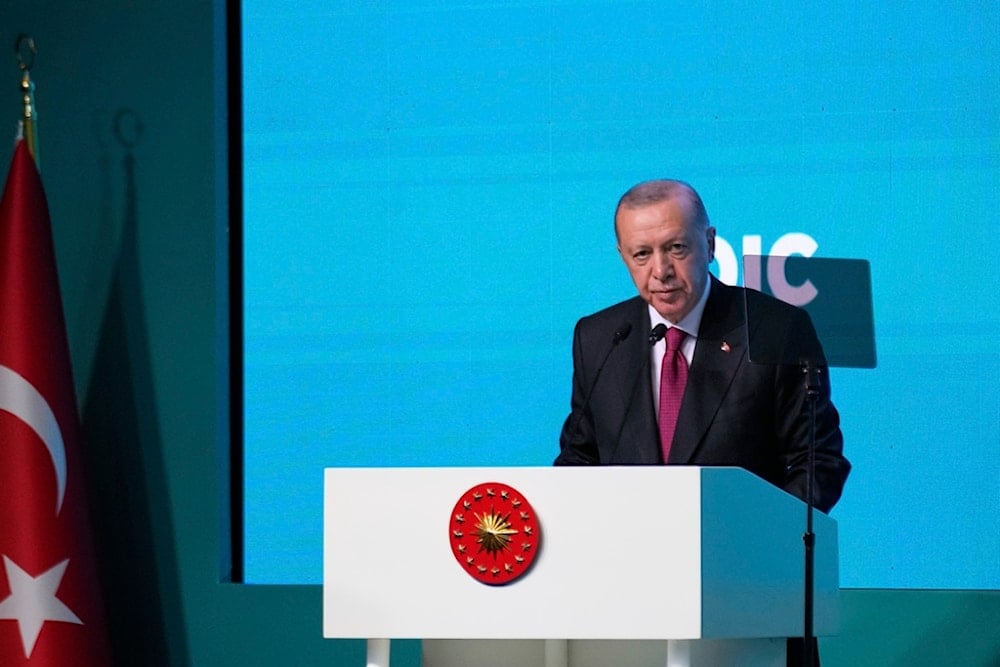Erdogan at OIC: No to new Sykes-Picot drawn in blood
Speaking at the 51st session of the Organization of Islamic Cooperation (OIC) Council of Foreign Ministers in Istanbul, Erdogan called for Muslim nations to unite against "Israel's" expanding war campaign and the Western-led effort to fracture regional resistance.
-

Turkey's President Recep Tayyip Erdogan gives an opening speech during the Council of Foreign Ministers of the Organisation of Islamic Cooperation meeting, in Istanbul, Turkiye, Saturday, June 21, 2025. (AP Photo/Khalil Hamra)
Turkish President Recep Tayyip Erdogan delivered a resolute warning on Saturday against what he described as a renewed imperialist conspiracy to redraw the map of West Asia through bloodshed and coercion. Speaking at the 51st session of the Organization of Islamic Cooperation (OIC) Council of Foreign Ministers in Istanbul, Erdogan called for Muslim nations to unite against "Israel's" expanding war campaign and the Western-led effort to fracture regional resistance.
"We will not allow the establishment of a new Sykes-Picot order in our region with borders to be drawn in blood," Erdogan declared, referencing the colonial blueprint that dismembered the Ottoman realm and laid the groundwork for Western domination. He denounced the genocidal siege of Gaza, now entering its 21st month, and likened its horrors to some of history's gravest atrocities. "Two million of our sisters and brothers in Gaza have been struggling to survive under these conditions," he said.
The Turkish president's remarks came as Iranian Foreign Minister Abbas Araghchi arrived in Istanbul following an Israeli airstrike on Iran's nuclear infrastructure, facilities monitored by the International Atomic Energy Agency (IAEA). Araghchi condemned the attack as a flagrant breach of international law and an "unforgivable crime," stressing that Iran will not remain passive in the face of such aggression. "In accordance with our legitimate right to self-defense, the Islamic Republic will stand resolutely against the Israeli aggression and will respond to it as it sees fit," he affirmed.
Araghchi called on the OIC to take a firm stance, warning that Israeli provocations threaten not just Iran, but the stability of the entire region. The Iranian delegation's demand for an emergency session was swiftly approved, resulting in a joint declaration by Muslim states condemning the attack and warning against any further targeting of nuclear sites. The statement also reaffirmed a longstanding demand for a nuclear-weapons-free Middle East, calling out "Israel's" undeclared arsenal and refusal to join the Non-Proliferation Treaty (NPT).
Resisting Colonial Maps
While many countries have capitulated to normalization deals with Tel Aviv, Iran has continued to champion Palestinian rights and resisted settler colonialism. Erdogan showed a similar position, stating, "We must show greater solidarity to stop Israel's acts of banditry not only in Palestine but also in Syria, Lebanon, and Iran," he declared.
In this context, Erdogan praised the steadfastness of the Iranian people and leadership. "We have no doubt that the Iranian people, with their solidarity in the face of difficulties and strong state experience, will hopefully overcome these days," he said.
The Zionist regime's aggression has also spilled into Turkish territory. Just days before the summit, Israeli fighter jets violated Turkish airspace, prompting an immediate response from Ankara. Turkish F-16s intercepted the aircraft, and military surveillance was heightened across the eastern frontier.
Erdogan responded by announcing a dramatic expansion of Turkey's missile stockpile, vowing to reach a level of deterrence that would force all adversaries to think twice. "We'll soon reach a defense capacity that no one will dare challenge," he warned. This move brings Turkey's defense doctrine closer to Iran's own deterrence model, which stresses strategic resilience and the refusal to bow to Western threats.
Read more: Iran urges Islamic unity as OIC plans emergency meet on 'Israel'
In a move welcomed by both Tehran and Damascus, Erdogan also called for Syria's full reintegration into the OIC, stressing that the Islamic world must support Syria's sovereignty, unity, and post-war recovery.
"Syria needs the support of all of us to protect its territorial integrity and achieve lasting stability," he said, signaling a potential realignment of Turkish regional policy in line with Iran's vision for a multipolar West Asia.

 4 Min Read
4 Min Read










